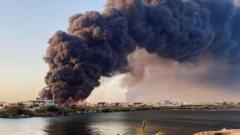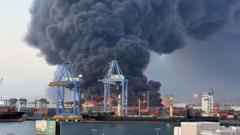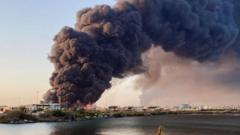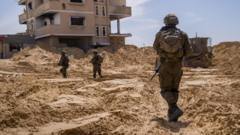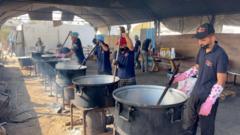A drone strike by the Rapid Support Forces on Port Sudan's military airport signifies an escalation in Sudan's civil conflict, which has already resulted in widespread displacement and humanitarian crises. The attack, aimed at military facilities and civilian infrastructure, highlights the shifting dynamics of the two-year conflict between the RSF and the Sudanese Armed Forces.
Paramilitary Group Targets Port Sudan in Unprecedented Attack Amid Ongoing Civil War
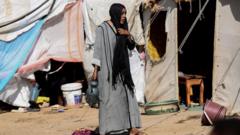
Paramilitary Group Targets Port Sudan in Unprecedented Attack Amid Ongoing Civil War
The Rapid Support Forces launch a drone strike on Port Sudan, marking a first in their attacks since the civil war erupted two years ago, raising humanitarian concerns.
In a shocking development, Port Sudan, the de-facto capital of Sudan’s military-led government, has come under attack by the Rapid Support Forces (RSF) for the first time since the civil war began two years ago. According to the Sudanese army, the drone assault on Sunday targeted the Osman Digna Air Base and other civilian facilities but thankfully resulted in no reported injuries. Army spokesperson Nabil Abdullah indicated that the attack caused only "limited damage" to the infrastructure.
Since the outbreak of the civil war in April 2023, an estimated 150,000 people have lost their lives, and around 12 million have fled their homes as a direct consequence of the power struggle between the Sudanese Armed Forces (SAF) and the RSF. The situation, labelled by the United Nations as the world’s most devastating humanitarian crisis, has left over 30 million in need of assistance, with millions facing food shortages and famine.
Prior to the drone strikes, Port Sudan had largely been viewed as a safe haven for displaced civilians and a strategic stronghold for the military-led government led by General Abdel Fattah-al Burhan. Following the SAF's loss of Khartoum early in the war, Port Sudan became the operational center for military and UN agencies, hosting hundreds of thousands seeking refuge from the conflict.
Reports indicate that the airport has since been closed, with all flights suspended following the strikes. Eyewitnesses described the chaos, including travelers being quickly evacuated from the terminal due to the airstrikes. Social media footage reportedly captured the immediate aftermath, showing large explosions and dark plumes of smoke rising into the sky.
The RSF's attack reflects a troubling trend; it is the latest in a series of drone strikes targeting military positions and infrastructure in areas controlled by the SAF. Just a day before, a drone assault occurred in Kassala, a town 250 miles from the nearest RSF outpost, demonstrating the expanding reach of the paramilitary forces.
As the SAF appears to have regained some momentum over recent months, including the recapture of the presidential palace in Khartoum, analysts caution that neither side is likely to secure a definitive victory that could restore peace and governance across Sudan. The civil war, now regarded as the country’s most severe conflict in seven decades, continues to fuel divisions and incite international concern.
The ongoing tensions stem from a coup in 2021, which positioned a council of generals at the helm of the nation. Conflicts arose as Al-Burhan and Hemedti, the leader of the RSF, clashed over the future direction of Sudan, particularly regarding the integration of RSF forces into the national army. With failed international peace efforts and external support bolstering both factions, the prospect of an enduring resolution remains bleak.




